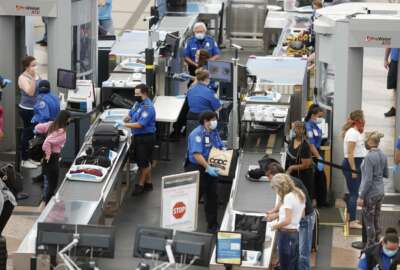The Federal Headlines is a daily compilation of the stories you hear discussed on Federal Drive with Tom Temin.
In today’s Top Federal Headlines, members of House and Senate committees who oversee federal contracting want to get rid of a rule passed in the final months of the Obama administration.
- Members of House and Senate committees who oversee workforce protections and federal contracting target another regulation from the Obama era. They introduced a joint resolution to block Obama’s “blacklisting” rule, which required federal contractors to report past labor law violations before doing business with the government. Republican lawmakers said it creates an unneeded burden on businesses. (House Committee on Education and the Workforce)
- The Office of Management and Budget and Office of Personnel Management have new guidance for agencies on the President’s hiring freeze. The memo lists several exemptions. They include Postal Service workers, and internal career ladder promotions. OPM may grant other exceptions in “critical situations,” They also include some temporary and seasonal employees who are needed to help handle work surges that traditionally occur. See the full list of exemptions and directions for agency leaders here.
- For some DoD employees, President Trump’s federal hiring freeze might wind up in layoffs. Though it was intended to reduce the federal workforce through gradual attrition, for hundreds, perhaps thousands of Defense workers in maintenance depots, it means they’ll be laid off. In the Army in particular, depot workers are term employees who are hired for one year at a time. Their appointments can’t be renewed under the terms of the current freeze. The Pentagon could exempt them, citing national security, but it hasn’t released any guidance on which positions it will protect. (Federal News Radio)
- President Trump said he will continue to enforce an executive order that protects employees from anti- LGBTQ discrimination who work for federal contractors. Former President Obama signed that order back in 2014. It said President Trump is determined to protect the rights of all Americans. (White House)
- A new executive order shifts cyber responsibilities to the government’s highest levels. Department secretaries will now be held more accountable than ever for managing their agency’s cyber risks. Under an updated draft executive order from President Donald Trump, agency senior leaders must implement the cybersecurity framework developed by the National Institute of Standards and Technology. Then, the Office of Management and Budget will assess and manage cyber risk governmentwide. The executive order also calls on agency leaders to develop a plan for the deliberate modernization of federal IT as part of the overall cyber effort. (Federal News Radio)
- Two lawmakers said federal employees should get a 3.2% pay raise in 2018. Congressman Gerry Connolly (D-Va.) and Senator Brian Schatz (D-Hawaii) introduced the Federal Adjustment of Income Rates, or FAIR Act. The bill proposes a 2 percent raise for most federal employees, plus a 1.2 percent locality pay adjustment. Both lawmakers introduced similar legislation last year. (Federal News Radio)
- Congress is busy with a slew of bills aimed at strengthening homeland protection. The House passes 17 bills covering homeland security issues. The bills originated in the Homeland Security Committee, chaired by Michael McCaul (R-Texas). Several touch on Department administrative issues. One requires better acquisition management. Another better fleet management. A third establishes an advisory board to help coordinate counter-terror intelligence and policy. Still another establishes a DHS insider threat program. (Federal News Radio)
- Federal auditors said the General Services Administration needs to report when an agency is leasing property owned by a foreign company, especially when using them for high-security activities. The Government Accountability Office cite Chinese companies who own properties used by the Secret Service and the Justice Department as examples. (Federal News Radio)
- The Air Force and Army may have themselves to blame for a shortage of drone pilots. Another GAO study states the services half-heartedly implemented human capital strategies that could have alleviated the drone pilot shortage problem. One of the strategies included using civilian employees to fly drones in some situations. (Federal News Radio)
Copyright
© 2024 Federal News Network. All rights reserved. This website is not intended for users located within the European Economic Area.





